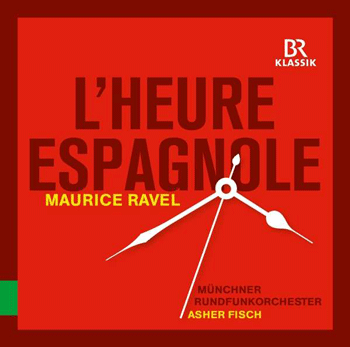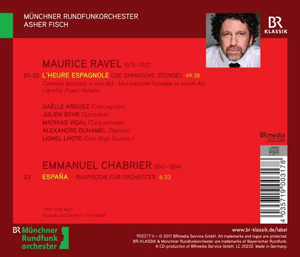Recently in Recordings
The Sixteen continues its exploration of Henry Purcell’s Welcome Songs for Charles II. As with Robert King’s pioneering Purcell series begun over thirty years ago for Hyperion, Harry Christophers is recording two Welcome Songs per disc.
In February this year, Albanian soprano Ermonela Jaho made a highly lauded debut recital at Wigmore Hall - a concert which both celebrated Opera Rara’s 50th anniversary and honoured the career of the Italian soprano Rosina Storchio (1872-1945), the star of verismo who created the title roles in Leoncavallo’s La bohème and Zazà, Mascagni’s Lodoletta and Puccini’s Madama Butterfly.
Collapsology. Or, perhaps we should use the French word ‘Collapsologie’ because this is a transdisciplinary idea pretty much advocated by a series of French theorists - and apparently, mostly French theorists. It in essence focuses on the imminent collapse of modern society and all its layers - a series of escalating crises on a global scale: environmental, economic, geopolitical, governmental; the list is extensive.
Amongst an avalanche of new Mahler recordings appearing at the moment (Das Lied von der Erde seems to be the most favoured, with three) this 1991 Mahler Second from the 2nd Kassel MahlerFest is one of the more interesting releases.
If there is one myth, it seems believed by some people today, that probably needs shattering it is that post-war recordings or performances of Wagner operas were always of exceptional quality. This 1949 Hamburg Tristan und Isolde is one of those recordings - though quite who is to blame for its many problems takes quite some unearthing.
The voices of six women composers are celebrated by baritone Jeremy Huw Williams and soprano Yunah Lee on this characteristically ambitious and valuable release by Lontano Records Ltd (Lorelt).
As Paul Spicer, conductor of the Royal Birmingham Conservatoire Chamber Choir, observes, the worship of the Blessed Virgin Mary is as ‘old as Christianity itself’, and programmes devoted to settings of texts which venerate the Virgin Mary are commonplace.
Ethel Smyth’s last large-scale work, written in 1930 by the then 72-year-old composer who was increasingly afflicted and depressed by her worsening deafness, was The Prison – a ‘symphony’ for soprano and bass-baritone soloists, chorus and orchestra.
‘Hamilton Harty is Irish to the core, but he is not a musical nationalist.’
‘After silence, that which comes closest to expressing the inexpressible is music.’ Aldous Huxley’s words have inspired VOCES8’s new disc, After Silence, a ‘double album in four chapters’ which marks the ensemble’s 15th anniversary.
A song-cycle is a narrative, a journey, not necessarily literal or linear, but one which carries performer and listener through time and across an emotional terrain. Through complement and contrast, poetry and music crystallise diverse sentiments and somehow cohere variability into an aesthetic unity.
One of the nicest things about being lucky enough to enjoy opera, music and theatre, week in week out, in London’s fringe theatres, music conservatoires, and international concert halls and opera houses, is the opportunity to encounter striking performances by young talented musicians and then watch with pleasure as they fulfil those sparks of promise.
“It’s forbidden, and where’s the art in that?”
Dublin-born John F. Larchet (1884-1967) might well be described as the father of post-Independence Irish music, given the immense influenced that he had upon Irish musical life during the first half of the 20th century - as a composer, musician, administrator and teacher.
The English Civil War is raging. The daughter of a Puritan aristocrat has fallen in love with the son of a Royalist supporter of the House of Stuart. Will love triumph over political expediency and religious dogma?
Beethoven Symphony no 9 (the Choral Symphony) in D minor, Op. 125, and the Choral Fantasy in C minor, Op. 80 with soloist Kristian Bezuidenhout, Pablo Heras-Casado conducting the Freiburger Barockorchester, new from Harmonia Mundi.
A Louise Brooks look-a-like, in bobbed black wig and floor-sweeping leather trench-coat, cheeks purple-rouged and eyes shadowed in black, Barbara Hannigan issues taut gestures which elicit fire-cracker punch from the Mahler Chamber Orchestra.
‘Signor Piatti in a fantasia on themes from Beatrice di Tenda had also his triumph. Difficulties, declared to be insuperable, were vanquished by him with consummate skill and precision. He certainly is amazing, his tone magnificent, and his style excellent. His resources appear to be inexhaustible; and altogether for variety, it is the greatest specimen of violoncello playing that has been heard in this country.’
Baritone Roderick Williams seems to have been a pretty constant ‘companion’, on my laptop screen and through my stereo speakers, during the past few ‘lock-down’ months.
Melodramas can be a difficult genre for composers. Before Richard Strauss’s Enoch Arden the concept of the melodrama was its compact size – Weber’s Wolf’s Glen scene in Der Freischütz, Georg Benda’s Ariadne auf Naxos and Medea or even Leonore’s grave scene in Beethoven’s Fidelio.
Recordings

14 Jan 2018
Maybe the Best L’heure espagnole Yet
The new recording, from Munich, has features in common with one from Stuttgart that I greatly enjoyed and reviewed here: the singers are all native French-speakers, the orchestra is associated with a German radio channel, we are hearing an actual performance (or in this case an edited version from several performances, in April 2016), and the recording is released by the orchestra itself or its institutional parent.
[For background on Ravel’s L’heure espagnole—the first of his two operas, each in a single act—and its previous recordings, see my review of the Stuttgart recording. ]
The results are much the same as in Stuttgart, except this time even better. The Concepción, Gaëlle Arquez, has a fuller voice than did Stéphanie d’Oustrac, yet is at least as alert to the quick shifts in the character’s moods and impulses. (The entire recording is available in segments on YouTube; here is the character’s one extended solo: “Oh! l’impitoyable aventure.”) I hope we get to hear Arquez in more recordings. (Here she is, acting and singing superbly, in the final moments of a live Carmen performance at Bregenz.) Mathias Vidal is a real heroic light tenor, if that phrase makes any sense. (I’d like to hear him sing Idomeneo!) His reading offers quite a contrast to the thinnish character-tenor sound produced on the Stuttgart recording—very effectively and skillfully, I admit—by Jean-Paul Fouchécourt. Alexandre Duhamel repeats his Ramiro, now conveying more of what the seemingly dim-witted mule-driver is experiencing. Julien Behr is a marvelous Gonsalve, singing with a bit more youthful flair and energy than the fine Yann Beuron. And Lionel Lhote, as Don Iñigo Gomez, points his lines more emphatically than Paul Gay did in the Stuttgart CD, yet without ever sacrificing vocal beauty.

The clear yet resonant acoustics of the Prinzregententheater in Munich add to the pleasure. (On this wonderful smallish theater, see my review of Wagner’s Lohengrin here.)
I imagine that much of the extra detail, dramatic impulse, and seeming spontaneity in this recording comes from the conductor, Asher Fisch, who has conducted extensively at the Israeli Opera, Seattle Opera, La Scala, and the Vienna Volksoper.
In short, this is now my favorite recording of Ravel’s scrumptious and witty 50-minute work. Essay, plot summary (with helpful track indications), and info on the orchestra and conductor. But nothing on the singers and no libretto. Fortunately, the French text and good translations can be found online, if one hunts around.
The opera is followed by Chabrier’s España, an appropriate pendant and always welcome, especially when performed so spiffily. (Here’s the complete performance of the Chabrier.) The microphone placement, though, seems less felicitous than in the opera: quiet string passages are hard to hear, yet drum whacks are over-resonant.
Ralph P. Locke
The above review is a lightly revised version of one that first appeared in American Record Guide and appears here by kind permission.
Ralph P. Locke is emeritus professor of musicology at the University of Rochester’s Eastman School of Music. Six of his articles have won the ASCAP-Deems Taylor Award for excellence in writing about music. His most recent two books are Musical Exoticism: Images and Reflections and Music and the Exotic from the Renaissance to Mozart (both Cambridge University Press). Both are now available in paperback, and the second is also available as an e-book.

